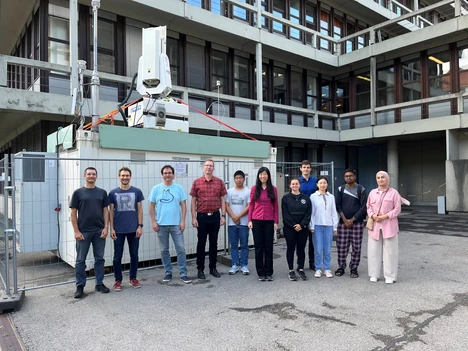Join Agenda for Air Quality
News |

In September 2025, an international workshop served as a platform for cutting-edge discussions on air-quality science, innovation, and solutions for pressing urban challenges. It was hosted by TUM Institute for Advanced Study, TUM-IAS, and organized by Prof. Jia Chen from the Technical University of Munich (TUM) and Prof. Frank N. Keutsch from Harvard University and TUM-IAS Hans Fischer Senior Fellow.
The event welcomed experts from globally renowned institutions, including Harvard University, Massachusetts Institute of Technology (MIT), UC Berkeley, Karlsruhe Institute of Technology (KIT), ETH Zurich, Tsinghua University, the University of Innsbruck, the University of Augsburg, and EMPA. Over three days, participants engaged in a rich exchange of knowledge and experience, sharing their latest findings and exploring collaborative opportunities.
A central highlight of the workshop was the presentation of results from a detailed air quality measurement campaign conducted in Munich during the summer of 2023 and the spring of 2024. This large-scale campaign, jointly carried out by the teams of Prof. Chen, Prof. Keutsch, and Dr. Harald Saathoff (KIT), aimed to address a critical question: When and what emissions can be effectively reduced to deliver a measurable improvement in Munich’s air quality? The campaign involved the deployment of advanced sensor networks, ground-based monitoring with high-precision instrumentation, and modeling tools, enabling the collection of an exceptionally detailed dataset. The insights generated are expected to guide both scientific understanding and future policy decisions aimed at improving air quality in urban areas.
Beyond the campaign results, the workshop facilitated in-depth discussions on a wide range of topics central to the future of air quality research. These included the characterization of heterogeneous urban emission sources, the application of high-resolution air quality modeling, the use of distributed sensor networks, and data-driven analytical approaches that leverage machine learning and big data. The exchange of ideas across these areas was particularly valuable, highlighting innovative ways to combine measurements and models to better understand pollution dynamics and inform effective mitigation strategies.
Participants also reflected on the broader implications of their work, emphasizing the importance of international collaboration in advancing air quality science. The workshop provided a unique setting to explore ongoing and prospective projects, identifying opportunities for joint studies that could address complex air pollution challenges at both local and regional scales. By building these collaborations, researchers aim to produce outcomes that have not only scientific but also societal impact, supporting evidence-based policy solutions that protect public health and the environment.
This workshop exemplifies TUM-IAS’s mission to foster interdisciplinary research and strengthen global partnerships to address some of today’s most urgent environmental issues, including climate change and air quality management. The insights shared and collaborations formed during the event are expected to shape future research directions and contribute to tangible improvements in urban air quality worldwide.
See also: https://salatainstitute.harvard.edu/international-air-quality-workshop-sets-collaborative-agenda/